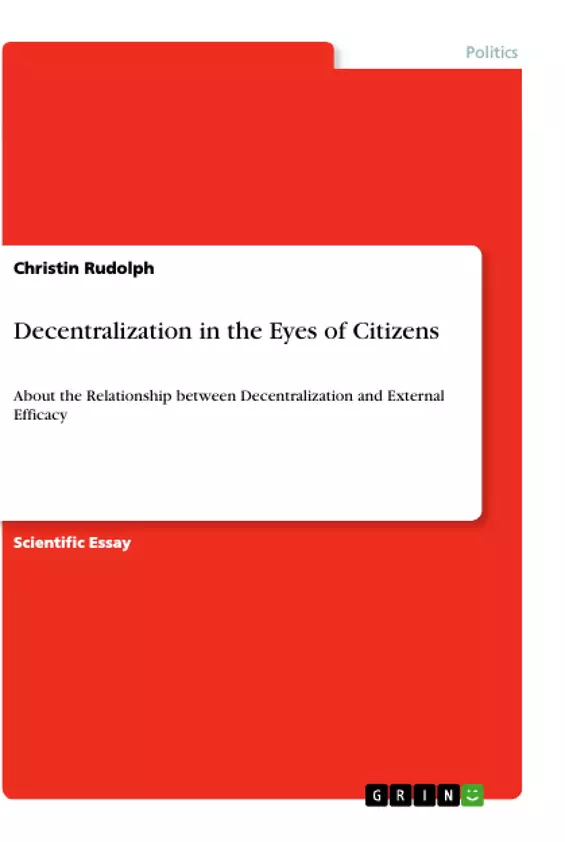Responsiveness is one of the features of a sustainable political system. External efficacy - the perceived responsiveness of the political system - forms the input of citizens. This process is influenced by the extent of decentralization of the respective political system. Decentralization, the transfer of policy-making power from a central government to different tiers of government, structures the perceptions and expectations of citizens and creates different forms of tiers of government that can be adjusted to the special needs of regions and their citizenry. Using data from a survey and the International Monetary Fund, this paper examines the effect of (fiscal) decentralization on perceived external efficacy while controlling for measures of trust, corruption and participation.
Inhaltsverzeichnis (Table of Contents)
- Decentralization Fosters External Efficacy - an Overview
- Organisational Structures and Feelings - About an Underlying Connection
- Context matters - a Review
Zielsetzung und Themenschwerpunkte (Objectives and Key Themes)
This paper investigates the impact of decentralization on perceived external efficacy, which is defined as the perceived responsiveness of the political system. It examines how the transfer of policy-making power from a central government to regional levels influences citizens' attitudes and perceptions of government responsiveness.
- The relationship between decentralization and external efficacy
- The role of citizens' perceptions and attitudes in shaping their relationship with the state
- The impact of decentralization on trust in government institutions
- The potential relationship between decentralization and corruption
- The importance of studying decentralization beyond formal constitutional structures
Zusammenfassung der Kapitel (Chapter Summaries)
- Decentralization Fosters External Efficacy - an Overview: This chapter introduces the concept of external efficacy and its importance for a functioning political system. It also outlines the relationship between decentralization and citizens' perceptions of government responsiveness.
- Organisational Structures and Feelings - About an Underlying Connection: This chapter explores the connection between institutional structures and citizens' attitudes towards the political system. It discusses the role of external efficacy in shaping citizens' participation and engagement in the political process.
- Context matters - a Review: This chapter reviews existing literature on decentralization and external efficacy. It analyzes different perspectives on the relationship between these two concepts and highlights the importance of studying decentralization beyond formal constitutional structures.
Schlüsselwörter (Keywords)
Decentralization, external efficacy, perceived responsiveness, citizens' perceptions, trust in government institutions, corruption, political participation, federalism, institutional structures, policy-making power.
Frequently Asked Questions
What is "External Efficacy" in politics?
External efficacy is the belief or perception of citizens that the political system and its government are responsive to their needs and demands.
How does decentralization affect government responsiveness?
Decentralization transfers power to regional levels, which can make government feel "closer" to citizens and more tailored to local needs, potentially increasing perceived efficacy.
Does fiscal decentralization improve trust in government?
Research suggests a connection, though it must be controlled for factors like corruption and the actual level of political participation in the regions.
Why is citizens' perception important for a political system?
Perceived responsiveness is a key input for political stability; if citizens feel ignored, their trust and engagement in the democratic process decline.
What is the role of the IMF in studying decentralization?
The International Monetary Fund provides data on fiscal structures, which researchers use to measure the actual degree of financial power held by local versus central governments.
- Quote paper
- Christin Rudolph (Author), 2017, Decentralization in the Eyes of Citizens, Munich, GRIN Verlag, https://www.grin.com/document/501246



